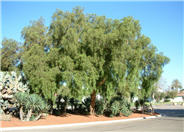
Common name:California Pepper, Mission Pepper
Botanical name:Schinus molle
The California Pepper is a fast growing evergreen tree that will mature to a height of 25'-40' and as wide. Its bright green leaves are divided into many narrow, 1.5"-2" long leaflets.
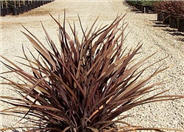
Common name:Amazing Red Flax
Botanical name:Phormium 'Amazing Red'
Phormium 'Amazing Red' is an evergreen perennial. It is a 2' tall, dramatic plant composed of many swordlike, stiffly vertical leaves in a fan pattern. Leaves are dark reddish brown in color.
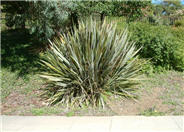
Common name:New Zealand Flax
Botanical name:Phormium tenax
New Zealand Flax is a large, bold plant with stiffly vertical, sword-like, green leaves that arise from its base. It should be grown under full sun for best color. Varieties will offer different growth habits and leaf color.
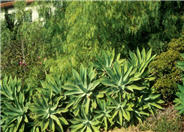
Common name:Fox Tail Agave, Velvet Agave
Botanical name:Agave attenuata
This Agave has a dramatic tropical form. Even light frost can damage its succulent leaves. It is great for containers. In the low desert, partial sun will be best. If it becomes top heavy, simply cut and stick in the ground to root. It is not a fast grower and has light green foliage. It will also die after flowering but pups around the mother will survive. Distinctive with its large rosette of leaves perched on a long curving trunk, it is a native from Mexico.
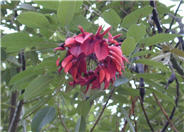
Common name:Cockspur Coral Tree, Ceibo
Botanical name:Erythrina crista-galli
This medium-size tree will grow 15'-25' tall and produces beautiful orange and red blooms. It will do best in wet soil and full sun.
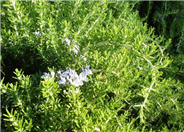
Common name:Rosemary
Botanical name:Rosmarinus officinalis
Rosemary is hardy in full sun areas where winter temperatures do not drop below 10 degrees F. They can be grown in a clay pot with well-drained, porous soil in bright indoor light, and will also flourish on the backporch in spring, summer and fall. Its beautiful, slowly trailing stems and shiny slender leaves are perfect for showing off the small, light blue flowers that blossom in the summer.
| Designer: Anon. | Corner Garden View from Street |
Photographer: GardenSoft |
Soils and Compost:
Physical weed control, including mulching, or hand removal protects the watershed from harmful chemicals.
Water Saving Tip:
Check your irrigation system for breaks, leaks and problems once a month.
Integrated Pest Management:
Drip and other smart irrigation delivers water directly to roots, allowing no excess water for weeds.
